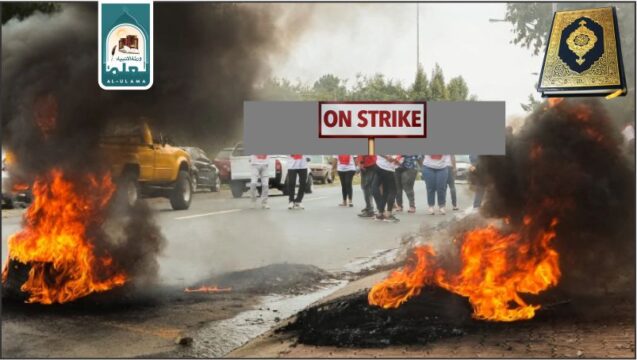Question
- I have two sons and one daughter from my first wife. She has passed away; how would her wealth/inheritance be distributed?
- After the death of my first wife I married her sister, from whom I have three sons and three daughters. The three sons are aged 18, 15, and 7 respectively. They are currently studying and also help out at the flour mill after school. Every now and then the eldest son, and sometimes his younger brother as well, take up a day labor or job.
I took some loans in order to send the elder son from my first wife to Saudi Arabia, but he came back a year later. Then again I took some loans and sent him to Iraq, where he stayed for a year and a half and then came back. While there, he used to send back as much amount as he was capable. We were a joint family, i.e. our earnings and expenses were combined.
Now that son is demanding for his money back saying that I have sent a lot of my money to you. I told him that our earnings and expenses have remained common, hence, I am willing to give you the share that is legally binding to you. So please guide me according to the Muhammadan legal law as to what or how much share should I give my son, keeping in mind that I have other sons and daughters as well?
(Muhammad Afzal s/o Ghulam Muhammad, Chiniot)
Answer
All Praise is due to Allaah, and may the peace and blessings of Allaah be upon the one who has no Prophet after him. To continue:
- With the presence of children, the share of the Husband from the wealth of his wife is one-fourth.
Allaah said:
{فَإِنْ كَانَ لَهُنَّ وَلَدٌ فَلَكُمُ الرُّبُعُ مِمَّا تَرَكْنَ}
{But, if they (your wives) have a child, you get one-fourth of what they leave}
(Al-Nisaa: 12)
As for the remaining entire wealth then it will go to the children (of the deceased) with the daughter receiving one share and the two sons receiving two shares each.
Allaah said:
{يُوصِيكُمُ اللَّهُ فِي أَوْلَادِكُمْ لِلذَّكَرِ مِثْلُ حَظِّ الْأُنْثَيَيْنِ}
{Allaah commands you regarding your children: the share of the male will be twice that of the female}
(Al-Nisaa: 11)
Therefore in the above case, the wealth will be divided into 20 equal shares for convenience: husband will receive five shares, first son will receive six shares, second son will receive six shares as well, and the daughter will receive three shares.
- Had the son clarified to his father that the money he is giving him is for safekeeping (Amaanah) then it would have been appropriate for him to demand his money back. However if the earnings and expenses of the family were common, as it is the norm in the eastern culture; wherein a father first raises his kids from his earning then the son earns and brings it back to his father; in this situation, the son is legally not at the position to demand his money back.
A man once came to the Prophet (ﷺ) and complained to him that his father ingurgitates his wealth. The Noble Prophet (ﷺ) said:
«أَنْتَ وَمَالُكَ لِوَالِدِكَ، إِنَّ أَوْلَادَكُمْ مِنْ أَطْيَبِ كَسْبِكُمْ، فَكُلُوا مِنْ كَسْبِ أَوْلَادِكُمْ»
“You and your wealth belong to your father. Your children are among the best of your earnings, so eat from the earning of your children”
(Sunan Abu Dawood: 3530)
In another wording of the narration:
«أَنْتَ وَمَالُكَ لِأَبِيكَ»
(Sunan Ibn Maajah: 2291)
The scholars have indeed debated whether the father is entitled to ownership and discretion in the wealth of his son, but one thing they have all agreed upon is that if a father uses or spends some of his son’s money due to a need that he has then the son cannot demand his money back from him. On the other hand, it is also not permissible for the father to try to cause any loss to one of his sons, or take one of his son’s money and bestow it to another.
Someone may raise a doubt concerning this hadeeth as it uses the word “اجتاح” which means ‘to ingurgitate wealth or devour it unjustly’ and yet the Prophet (ﷺ) has approved this act of the father. Does that mean it is permissible for the father to do such a thing?
It should be known that it is not possible for the Prophet (ﷺ) to have upheld injustice. However it can be said that whatever wealth the father had taken from his son due to a necessity was considered ‘unjust consumption’ by the son’s perspective. Hence the Prophet (ﷺ) explained to the son that this notion of his is wrong, but in fact, you and your wealth is halaal for your father and he can use you and your wealth based on his needs just as he has discretion in his own self and wealth. And Allaah knows best.
‘Allaamah Khattaabi writes under the explanation of this hadeeth:
“إذا احتاج إلى مالك أخذ منك قدر الحاجة كما يأخذ من مال نفسه، فأما أن يكون أراد به إباحة ماله حتى يجتاحه ويأتي عليه فلا أعلم أحدًا ذهب إليه”
“(The meaning of this hadeeth is that) when the father is in need of your wealth he can take from you according to his necessity just as he would take from his own wealth. I do not know of anyone who said that the Prophet (ﷺ) intended father’s complete liberty in his wealth such that he unjustly devours it and gobbles it.”
(Ma’aalim al-Sunan (3/166))
A number of Muhadditheen have mentioned this hadeeth and extracted from it the ruling that it is obligatory for the son to fulfill the needs and expenses of the parents.
It should be noted that it is the father’s responsibility to nourish and fulfill the needs of his children. If a child is in need of milk then it is the father’s responsibility to arrange for the milk. If a child is seeking knowledge then it is his father’s responsibility to pay the expenses. It is not necessary to have complete equality with regard to the children’s needs, however, if something is given as a gift then doing equality among the children is compulsory. There is no difference between male and female in this regard.
It is narrated from Nu’maan bin Basheer (radiallah anhu) that his father gifted him with a slave. His mother asked that the Messenger of Allaah (ﷺ) be made a witness to it. When he and his father came to the Messenger of Allaah (ﷺ), he (ﷺ) asked: “Do you have other children besides him?” He said: “Yes.” The Prophet (ﷺ) asked: “Have you given this gift to all of them?” He said: “No”. Then the Prophet (ﷺ) said: “Do not make me a witness for injustice. Be just to your children.” After this, Nu’maan’s father took the gift back from him.
(Saheeh Bukhaari: 2650, 2587, 2586)
To summarize, a son can only take wealth from his father in one of three situations:
- It is needed for the son’s education or his routinely needs, in which case the father will spend based on his capability.
- Father bestows a gift; but being just to all the children is necessary in this case.
- The son had entrusted his father with something.
The scenario presented in the question does not fall in any of the three cases. Therefore, the demand of the son is wrong and it is also not permissible for the father to give him something extra separately from the others.
And Allaah knows best.
Noble Muftis
His excellence Shaykh Abu Muhammad AbdusSattar Hammad (President of the Lajnah)
His excellence Shaykh Abdul Haleem Bilal (may Allah preserve him)
His excellence Shaykh Javed Iqbal Sialkoti (may Allah preserve him)

















